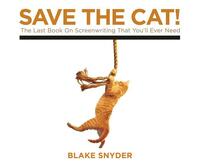Take a photo of a barcode or cover
Definitely helped me make the most of my screenplay idea with the added side effect of helping me get excited about writing it again.
This was okay. Gave some good pointers and some good advice. But you have to wonder how good the advice is from the screenwriter who wrote "Stop or My Mom Will Shoot" and "Blank Check." But some people wind up being better teacher so....
My year of listening to the Harry Potter series has gotten me really interested in story structure. I stumbled on this series and, though it's about screenplays, not novels, it's got some really solid story and revision advice (regardless of the cheesiness of Blake Snyder's own scripts). I've thought repeatedly about 1) ALL STORIES ARE ABOUT TRANSFORMATION, and 2) his advice to make characters' drives primal: rooted in survival, hunger, sex, protection of loved ones, fear of death. This has changed how I look at compelling characters.
Favorite quotes:
In a sense, stories are ABOUT change. And the measuring stick that tells us who succeeds and who doesn’t is seen in the ability to change. Good guys are those who willingly accept change and see it as a positive force. Bad guys are those who refuse to change, who will curl up and die in their own juices, unable to move out of the rut their lives represent. To succeed in life is to be able to transform. That’s why it’s the basis not only of good storytelling but also the world’s best-known religions. Change is good because it represents re-birth, the promise of a fresh start.
The truth is that movies are so much about what happens that we must learn about characters by what they do, not by what they say. As in Life, character is revealed by action taken, not by words spoken.
Three acts: thesis, antithesis, synthesis
In many a well-told movie, the hero and the bad guy are very often two halves of the same person struggling for supremacy, and for that reason are almost equal in power and ability...And each has something the other wants...even if it’s just an answer to what makes them the way they are.
The trick is to create heroes who:
Offer the most conflict in that situation
Have the longest way to go emotionally
Are the most demographically pleasing
As writers we tend to be insular, introverted, and introspective. But if you want to sell your script, you have to sell yourself -- and I say this in the most healthy and positive sense. There is no crass salesmanship if you are genuinely interested in your subject.
If you are lucky enough to have a career, you will be bumping into these people again and again for years. So try not to burn any bridges, or at least try not to burn them all the way down.
When characters are not acting like human beings, when they are not being driven primally, odds are you are testing the patience of the audience. To ask “Is it primal?” is to ask “Is this relevant to a caveman?” The answer must be: Yes!
Favorite quotes:
In a sense, stories are ABOUT change. And the measuring stick that tells us who succeeds and who doesn’t is seen in the ability to change. Good guys are those who willingly accept change and see it as a positive force. Bad guys are those who refuse to change, who will curl up and die in their own juices, unable to move out of the rut their lives represent. To succeed in life is to be able to transform. That’s why it’s the basis not only of good storytelling but also the world’s best-known religions. Change is good because it represents re-birth, the promise of a fresh start.
The truth is that movies are so much about what happens that we must learn about characters by what they do, not by what they say. As in Life, character is revealed by action taken, not by words spoken.
Three acts: thesis, antithesis, synthesis
In many a well-told movie, the hero and the bad guy are very often two halves of the same person struggling for supremacy, and for that reason are almost equal in power and ability...And each has something the other wants...even if it’s just an answer to what makes them the way they are.
The trick is to create heroes who:
Offer the most conflict in that situation
Have the longest way to go emotionally
Are the most demographically pleasing
As writers we tend to be insular, introverted, and introspective. But if you want to sell your script, you have to sell yourself -- and I say this in the most healthy and positive sense. There is no crass salesmanship if you are genuinely interested in your subject.
If you are lucky enough to have a career, you will be bumping into these people again and again for years. So try not to burn any bridges, or at least try not to burn them all the way down.
When characters are not acting like human beings, when they are not being driven primally, odds are you are testing the patience of the audience. To ask “Is it primal?” is to ask “Is this relevant to a caveman?” The answer must be: Yes!
This is all about the formula, and even if you don't want to use it, you have to know it. Good advice on story structure, and making each scene count. Great chapter on storyboards (color coding: a fun way to waste time, that will actually prove helpful later).
Considering how dated Snyder's references are, his ideas are solid and his conversational tone makes it an easy read.
I was reading this, not because of a desire to write a screen play, but instead as a lesson on writing (anything) towards a specific audience. This point is explored early in the book and was very insightful.
I was reading this, not because of a desire to write a screen play, but instead as a lesson on writing (anything) towards a specific audience. This point is explored early in the book and was very insightful.
It was good for what its designed for, but since I'm not a screen writer not sure it was really helpful.
The book could've been half as long and gotten across all of the information perfectly well. In that respect it's kind of a trudge to read through. There's good information in there, though, but maybe half of it is what you'll get in any screen- or other writing book.
This is the best book on screenwriting I have ever read. I'm not going to trawl the contents for you, if you want to know how to construct a screenplay that works, read this book.
This book was written in 2005. A lot of social media and how information is gathered and passed on has changed. That is a minor point. The bulk of the book is that you as the writer has to put in the work. Have you done Six Things That Need Fixing? The Bad Guy Badder? Read this book
Snyder makes the claim that he's trying to write a screenwriting book that's less academic. This makes a lot of sense. The advice is helpful, if not a little cynical (but he warns us of this ahead of time).
What I really missed was the gender inclusivity that appears in some of those more academic books. This becomes most obvious when he presents the following two archetypes:
> There's the "young man on the rise" archetype -- [. . .] a little dumb, but plucky, this is the type we all want to see win.
> There's the "good girl tempted" archetype -- pure of heart, cute as a bug [. . .] This is the female counterpart of the young man on the rise. (58)
And Snyder doesn't even pretend to acknowledge that BAD GUYS can also be BAD GIRLS.
But it's a book that everyone interested in screenwriting should read because the advice is good and it's ubiquitous.
What I really missed was the gender inclusivity that appears in some of those more academic books. This becomes most obvious when he presents the following two archetypes:
> There's the "young man on the rise" archetype -- [. . .] a little dumb, but plucky, this is the type we all want to see win.
> There's the "good girl tempted" archetype -- pure of heart, cute as a bug [. . .] This is the female counterpart of the young man on the rise. (58)
And Snyder doesn't even pretend to acknowledge that BAD GUYS can also be BAD GIRLS.
But it's a book that everyone interested in screenwriting should read because the advice is good and it's ubiquitous.






